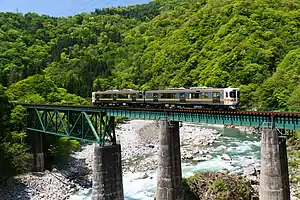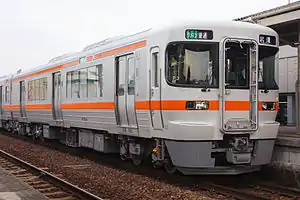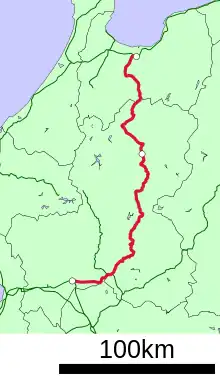Takayama Main Line
The Takayama Main Line (高山本線, Takayama Honsen) is a Japanese railway line between Gifu Station in Gifu and Toyama Station in Toyama, operated by Central Japan Railway Company (JR Central) and West Japan Railway Company (JR West). The line directly links the Chūkyō Metropolitan Area (metropolitan Nagoya) and Hokuriku region in a shorter distance, but with a longer travel time, than by using the combination of the Tōkaidō Shinkansen and Hokuriku Main Line. Now the line primarily functions as a way to access the scenic areas of Hida (ancient Hida Province), in the rugged mountains of northern Gifu Prefecture, such as Gero onsen (hot spring), Takayama, Shirakawa-gō, and the Kiso River. The first section of the line, between Gifu and Kagamigahara, opened in 1920. The whole line was completed in 1934.
| Takayama Main Line | |||
|---|---|---|---|
 Local train running on the Takayama Main Line in May 2022 | |||
| Overview | |||
| Native name | 高山本線 | ||
| Status | Operational | ||
| Owner | JR Central, JR West | ||
| Locale | Japan | ||
| Termini |
| ||
| Stations | 45 | ||
| Service | |||
| Type | Heavy rail | ||
| Operator(s) | JR Central, JR West | ||
| Rolling stock | JR Central: KiHa 75 series DMU, HC85 series DEMU, KiHa 25 series DMU JR West: KiHa 120 series DMU | ||
| History | |||
| Opened | 25 October 1934 | ||
| Technical | |||
| Line length | 225.8 km (140.3 mi) | ||
| Number of tracks | Entire line single tracked | ||
| Character | Rural | ||
| Track gauge | 1,067 mm (3 ft 6 in) | ||
| Electrification | Not electrified | ||
| Operating speed | 110 km/h (68 mph) | ||
| |||
Basic data
- Operators, distances:
- Total distance: 225.8 kilometres (140.3 mi)
- Central Japan Railway Company (Category 1)
- Gifu - Inotani: 189.2 kilometres (117.6 mi)
- West Japan Railway Company (Category 1)
- Inotani - Toyama: 36.6 kilometres (22.7 mi)
- Japan Freight Railway Company (Category 2)
- Inotani - Toyama: 36.6 km
- Railway signalling:
- Gifu - Inotani: Automatic
- Inotani - Toyama: Special Automatic, a simplified automatic system
- CTC center:
- Gifu - Inotani: Tōkai Operation Control Center
- Inotani - Toyama: Kanazawa Operation Control Center
Services
The Hida limited express train operates between Nagoya and Takayama, Hida-Furukawa, and Toyama, with ten return services a day, and between Ōsaka and Takayama with one return service a day, with trains to and from Nagoya reversing direction at Gifu en route.
The line is generally divided to three parts for local services: between Gifu and Takayama; between Takayama and Inotani; and between Inotani and Toyama. There are roughly two trains per one hour between Gifu and Mino-Ōta, while there is no local train for four hours between Gero and Takayama.
Stations
Legend:
- ●: All trains stop
- ▲: Some trains stop
- |: All trains pass
- Local trains stop at all stations.
| No. | Station | Distance | Limited Express Hida | Transfers | Location | ||
|---|---|---|---|---|---|---|---|
| JR Central | |||||||
| CG00 | Gifu | 岐阜 | 0.0 | ● | Gifu | Gifu | |
| CG01 | Nagamori | 長森 | 4.2 | | | |||
| CG02 | Naka | 那加 | 7.2 | | | Kakamigahara | ||
| CG03 | Sohara | 蘇原 | 10.4 | | | |||
| CG04 | Kagamigahara | 各務ヶ原 | 13.2 | | | |||
| CG05 | Unuma | 鵜沼 | 17.3 | ▲ |
| ||
| CG06 | Sakahogi | 坂祝 | 22.5 | | | Sakahogi, Kamo | ||
| CG07 | Mino-Ōta | 美濃太田 | 27.3 | ● | Minokamo | ||
| Kobi | 古井 | 30.3 | | | ||||
| Nakakawabe | 中川辺 | 34.1 | | | Kawabe, Kamo | |||
| Shimoasō | 下麻生 | 37.9 | | | ||||
| Kamiasō | 上麻生 | 43.2 | | | Hichisō, Kamo | |||
| Shirakawaguchi | 白川口 | 53.1 | ▲ | Shirakawa, Kamo | |||
| Shimoyui | 下油井 | 61.7 | | | ||||
| Hida-Kanayama | 飛騨金山 | 66.7 | ▲ | Gero | |||
| Yakeishi | 焼石 | 75.7 | | | ||||
| Gero | 下呂 | 88.3 | ● | ||||
| Zenshōji | 禅昌寺 | 93.5 | | | ||||
| Hida-Hagiwara | 飛騨萩原 | 96.7 | ▲ | ||||
| Jōro | 上呂 | 100.8 | | | ||||
| Hida-Miyada | 飛騨宮田 | 105.4 | | | ||||
| Hida-Osaka | 飛騨小坂 | 108.8 | ▲ | ||||
| Nagisa | 渚 | 115.9 | | | Takayama | |||
| Kuguno | 久々野 | 123.2 | ▲ | ||||
| Hida-Ichinomiya | 飛騨一ノ宮 | 129.5 | | | ||||
| Takayama | 高山 | 136.4 | ● | ||||
| Hozue | 上枝 | 141.0 | | | ||||
| Hida-Kokufu | 飛騨国府 | 147.6 | | | ||||
| Hida-Furukawa | 飛騨古川 | 151.3 | ● | Hida | |||
| Sugisaki | 杉崎 | 153.6 | | | ||||
| Hida-Hosoe | 飛騨細江 | 156.0 | | | ||||
| Tsunogawa | 角川 | 161.7 | | | ||||
| Sakakami | 坂上 | 166.6 | | | ||||
| Utsubo | 打保 | 176.5 | | | ||||
| Sugihara | 杉原 | 180.5 | | | ||||
| Inotani | 猪谷 | 189.2 | ● | Toyama | Toyama | ||
| JR West | |||||||
| Inotani | 猪谷 | 189.2 | ● | Toyama | Toyama | ||
| Nirehara | 楡原 | 196.2 | | | ||||
| Sasazu | 笹津 | 200.5 | | | ||||
| Higashi-Yatsuo | 東八尾 | 205.0 | | | ||||
| Etchū-Yatsuo | 越中八尾 | 208.7 | ● | ||||
| Chisato | 千里 | 213.6 | | | ||||
| Hayahoshi | 速星 | 217.9 | ▲ | ||||
| Fuchū-Usaka | 婦中鵜坂 | 219.6 | | | ||||
| Nishi-Toyama | 西富山 | 222.2 | | | ||||
| Toyama | 富山 | 225.8 | ● | ||||
Passing loops
Hisuikyō
In Hichisō, Gifu. (Coordinates: 35°32′43″N 137°08′39″E )
Washibara
In Shirakawa, Gifu. (Coordinates: 35°36′06″N 137°10′24″E )
Fukurai
In Gero, Gifu. (Coordinates: 35°40′51″N 137°10′00″E )
Shōgano
In Gero, Gifu. (Coordinates: 35°47′42″N 137°15′13″E )
 Hisuikyō
Hisuikyō
A: Kamiasō
B: Shirakawaguchi Washibara
Washibara
A: Shirakawaguchi
B: Shimoyui Fukurai.
Fukurai.
A: Yakeishi
B: Hida-Kanayama Shōgano
Shōgano
A: Yakeishi
B: Gero
Rolling stock
JR Central
- KiHa 75 series DMUs
- HC85 series hybrid Diesel-Electric multiple units (Hida limited express services)
- KiHa 25 series DMUs (from March 2015)
JR West
- KiHa 120-300 DMUs
Former rolling stock
- KiHa 11 series DMUs (until March 2015)
- KiHa 40 series DMUs (until June 2015)
- KiHa 85 series
From the start of the March 2015 timetable revision, JR Central KiHa 25 series diesel multiple unit (DMU) trains displaced from the Taketoyo Line were phased in on Takayama Line services, with the last remaining KiHa 40 series DMU trains withdrawn from the line on 30 June 2015.[1]
 A JR Central KiHa 40 series DMU, September 2004
A JR Central KiHa 40 series DMU, September 2004 A KiHa 25 series DMU
A KiHa 25 series DMU A KiHa 120-300 DMU
A KiHa 120-300 DMU
History
The Gifu to Mino-Ota section opened in 1920, and the line was then extended in sections, opening to Gero in 1930 and Hida-Osaka in 1933. At the northern end the first section from Toyama opened in 1927, reached Inotani in 1930 and Takayama and Hida-Osaka in 1934, completing the line.
CTC signalling was commissioned in 1968, and in 1980, a ground-breaking ceremony was held at Takayama for the proposed electrification of the line, but the program was cancelled later that year before any significant work was undertaken. Freight services ceased on the line in 2007.
Between 2004 and September 8, 2007, the section between Tsunogawa Station and Inotani Station was closed due to flood damage from Typhoon Tokage.[2]
Former connecting lines
- Hida-Osaka Station: The 762 mm (2 ft 6 in) gauge Kosaka Forest railway commenced operation in 1933, and by 1953 consisted of seven lines with a total length of 65 km. Line closures commenced in 1954, and the system closed in 1971.
- Inotani Station: The 610 mm (2 ft) 24 km line to Kamioka-Cho (which was opened in 1910 by the local government from Sasazu station) was acquired by the Mitsui Mining Co. in 1927. In 1931, a 2 km line to alter the connection to Inotani Station opened (with the 16 km section providing the Sasazu connection closing at the same time) and an 8 km branch opened in 1937, connecting to the 762 mm (2 ft 6 in) gauge Sugoroku-Kanakida Forest railway (which consisted of a 16 km main line and three branches between 3 and 6 km in length, and operated from 1930 to 1963). Passenger services ceased in 1962, and the mine and railway closed in 1967.
- Sasazu Station: As mentioned above, the 610 mm gauge 24 km line to Kamioka-Cho operated from 1910 until altered to connect at Inotani station in 1931. The Toyama Railway operated a 12 km line to Minami-Toyama between 1914 and 1933. In 1943, the Toyama Electric Railway reopened the line, electrified at 600 V DC, and operated it until 1975. The 20 km Kamioka Line to Okuhida-Onsenguchi opened in 1966. Freight services ceased in 1981, and the line closed in 2006.
See also
References
- 高山本線からキハ40系が引退 [KiHa 40 series withdrawn from Takayama Main Line]. Japan Railfan Magazine Online (in Japanese). Japan: Koyusha Co., Ltd. 2 July 2015. Retrieved 2 July 2015.
- 高山線全線の運転再開について (About resuming the operation of the whole Takayama Line), news release by JR Central. Archived 23 June 2007 at the Wayback Machine
